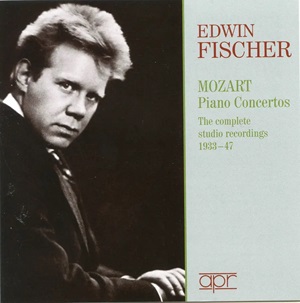
Edwin Fischer (piano)
Mozart Piano Concertos. Complete Studio Recordings
rec. 1933-1947
APR 7303 [3 CDs: 221]
Not only was Edwin Fischer one of the finest pianists of the twentieth century, but he was also renowned as a pedagogue and conductor. His studies began in Basel, Switzerland, and he later progressed to the Stern Conservatory in Berlin for tuition with Martin Krause, one of Liszt’s last students. Renowned for his interpretations of Bach, Mozart, Beethoven, Schubert and Brahms, he made the first complete recording of Bach’s Well-Tempered Clavier in the 1930s. In 1932, he formed his own chamber orchestra and returned to the classical norm of conducting from the keyboard. Examples of him as pianist/conductor are to be found in this set.
These Mozart recordings are not new to the catalogue. All were included in a 12 disc box set issued as an EMI Icon box in 2010 and reviewed at the time by my colleague Jonathan Woolf. It’s worth noting that the Haydn Concerto in this APR collection is not included in the EMI Icon box. As I possess the Icon box, I thought that I would compare the transfers. There’s not a lot of difference between the samples I compared. The only thing I noticed was that EMI had a better source copy of Piano Sonata No 10 in C major, K330. APR’s had some clicks in the first movement which were absent in my EMI copy. If you already have the Icon box, you might be concerned about duplication, and I don’t think there’s any need to replace it.
Fischer took five Mozart Concertos into the studio. Two of these, K466 and K453, he directed from the keyboard himself. In the other three he’s partnered by Barbirolli, Krips and Lawrence Collingwood. He takes a romantic approach to his Mozart playing and in the slow movements, especially, there are moments of breathtaking beauty. His tone is warm and rounded, and there’s a crystalline clarity to his passage work. There are some fine examples of this in the opening movement of the Piano Concerto No 24 in C minor, K491. He has a tendency to opt for brisker tempi in the outer movements generally. They certainly seem faster than we are used to today.
There’s one occasion when this is taken to extremes with deleterious effect. I’m referring to the first movement of his self-directed performance of the Concerto in G major, K453. The end result is a mad scramble. The pianist employs his own cadenzas in all five concertos. Some commentators have described them as anachronistic. All I can say is that I have heard better. The most unimaginative is in the final movement of K482. Of the three conductor-led performances, the Krips is the most successful. His support is inspiring and engaging. Collinwood isn’t too bad, either. Barbirolli is the least effective, and often sounds underwhelmed, sluggish and pedestrian in his accompaniment.
Fischer was known to suffer from stage fright and “nerves” during performance. This resulted in technical insecurities. One has to accept these flaws as part and parcel of the overall package. Yet, all told they are recordings I wouldn’t like to be without; you take the rough with the smooth, with the benefits outweighing all of these picky caveats.
There are two piano sonatas by Mozart featured. No 11 in A major, K331 is notable for its poise and elegance. Tempi sit nicely, and dynamics are varied. The variations of the first movement are stylish. The Rondo alla turca is rhythmically buoyant and sparkles. In No 10 in C major K330, the outer movements are dispatched at a fair lick. In the central Andante cantabile, Fischer makes the lines truly sing, and the phrasing is both eloquent and expressive.
The Haydn D major Concerto is a scintillating and energized performance, which the pianist directs from the keyboard. There’s an ideal balance struck between soloist and the Vienna Philharmonic strings, who are in fine fettle, sounding lush and blooming. It’s all capped off with a punchy finale of vim and vigour.
APR’s endeavours are of real value and virtue to the pianophile, with splendid transfers courtesy of Bryan Crimp. Roger Smithson’s booklet notes, which accompany the release, are in English, French and German, and offer valuable commentary on the various works performed.
Stephen Greenbank
See also the review by Jonathan Woolf of EMI’s 12-CD Icon box Edwin Fischer – Piano Playing from the Heart
Buying this recording via a link below generates revenue for MWI and helps us keep free access to the site



Contents:
Wolfgang Amadeus Mozart (1756-1791)
CD 1
Piano Concerto No 20 in D minor K466, London Philharmonic Orchestra/Edwin Fischer (from the piano) – rec. 24 November 1933, London
Piano Concerto No 22 in E flat major K482, Unnamed Orchestra/John Barbirolli – rec. 6 June 1935, London
Rondo for piano and orchestra in D major K382, Edwin Fischer Chamber Orchestra/Edwin Fischer (from the piano) – rec. 13 October & 30 November 1936, Berlin
Minuet in G major K1 (arr. by Edwin Fischer) – rec. 25 November 1933, London
CD 2
Piano Concerto No 17 in G major K453, Edwin Fischer Chamber Orchestra/Edwin Fischer (from the piano) – rec. 7 May 1937, Berlin
Piano Concerto No 24 in C minor K491, London Philharmonic Orchestra/Lawrance Collingwood – rec. 3 March 1937, London
Fantasia in C minor K396 – rec. 28 August 1934, London
Piano Sonata No 11 in A major K331 – rec. 28 April 1933, London
CD 3
Piano Concerto No 25 in C major K503, Philharmonia Orchestra/Josef Krips – rec. 10 October 1947, London
Piano Sonata No 10 in C major K330 – rec. 6 March 1937, London
Fantasia in C minor K475 – rec. 29 May 1941, Berlin
Romance in A flat major KAnh205 – rec. 29 May 1941, Berlin
Joseph Haydn (1732-1809)
Concerto in D major Hob XVIII:11, Vienna Philharmonic Orchestra/Edwin Fischer (from the piano) – rec. circa 19–22 October 1942, Vienna

















